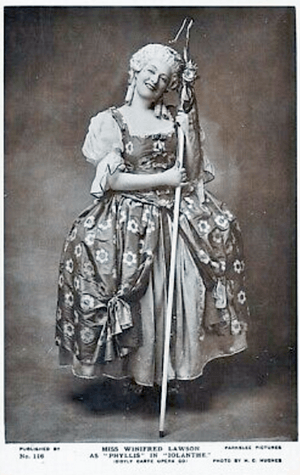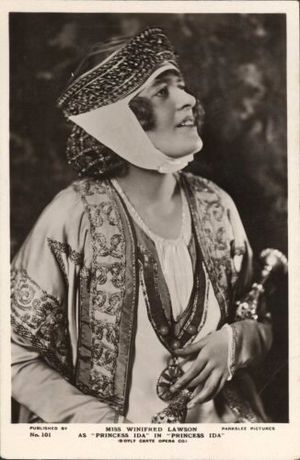Winifred Lawson facts for kids

Winifred Lawson (born November 15, 1892 – died November 30, 1961) was a famous English singer. She performed in both operas and concerts during the first half of the 1900s. People especially remember her for her amazing performances as a soprano (a high female singing voice) in the Gilbert and Sullivan operas. She was a key member of the D'Oyly Carte Opera Company from 1922 to 1932.
Winifred started her singing journey as a concert performer. In 1920, she made her first opera appearance in The Marriage of Figaro. She also helped bring back Purcell's opera The Fairy-Queen, which hadn't been performed in over 200 years! She even created the role of Guinevere in an opera called The Round Table. Soon, Winifred was playing many different characters, from Marguerite in Faust to Bessie Throckmorton in Merrie England. For almost ten years, she was the main soprano for the D'Oyly Carte company, performing in 10 leading Savoy opera roles. She also sang Lili in Lilac Time and started broadcasting on BBC radio in 1929.
In the mid-1930s, Winifred sang for two seasons with the Vic Wells Opera. She performed in operas like The Marriage of Figaro (as Susanna), Così fan tutte (Fiordiligi), Don Giovanni (Zerlina), The Magic Flute (Genius), Pagliacci (Nedda), Faust (Marguerite), and La bohème. After this, she toured Australia and New Zealand, singing many of her well-known Gilbert and Sullivan roles. She stopped performing in operas in 1938. However, she continued to entertain soldiers during the Second World War and kept broadcasting and recording music.
Contents
Winifred Lawson's Life and Career
Her Early Singing Days
Winifred Lawson was born in Wolverhampton, England. Her father, Alexander Lawson, was an artist. She went to school in Wolverhampton and also in Vevey, Switzerland. She began her career singing in concerts. A newspaper, The Times, once wrote in 1918 that it was rare to hear a high soprano who sang so perfectly and clearly.
In 1920, Winifred made her first appearance on the London opera stage. She played Countess Almaviva in The Marriage of Figaro at the Old Vic theatre. The Times reviewer said that Winifred and two other singers showed everyone "there is nothing in the world quite so beautiful as Mozart's airs for the soprano voice."
In February 1920, Winifred also sang as the main soprano with her Old Vic friends in the first performances of Purcell's The Fairy-Queen in over two centuries. A famous music critic, Ernest Newman, praised her performance. That same year, she sang as a soloist at the Royal Albert Hall in London. She also performed at Rutland Boughton's Glastonbury Festival. There, she created the role of Guinevere in his opera The Round Table in August 1920. Other characters she played in 1920 and 1921 included one of the three Genii in The Magic Flute, Marguerite in Faust, and Bessie Throckmorton in Edward German's Merrie England.
Becoming a D'Oyly Carte Star
In January 1922, Winifred Lawson joined the D'Oyly Carte Opera Company. She started as a special guest during their London shows at the Prince's Theatre. She took over the main role in Princess Ida. The owner of the company, Rupert D'Oyly Carte, then asked her to join full-time. For the rest of the 1921–22 tour, she played Patience in Patience, Casilda in The Gondoliers, and Elsie Maynard in The Yeomen of the Guard.
In the 1922–23 season, she added the role of Phyllis in Iolanthe. In July 1923, she became Yum-Yum in The Mikado. Sometimes in The Gondoliers, she played Gianetta instead of Casilda, and she switched to Gianetta permanently in January 1927. In the same month, she also started playing Josephine in H.M.S. Pinafore.
Towards the end of the 1927–28 season, Winifred had some vocal issues. She had to leave the company for a short time to have surgery. She fully recovered but couldn't sing again until later in 1928. By then, the D'Oyly Carte company was on an eight-month tour of Canada. Winifred toured Britain playing Lili in Lilac Time instead. She rejoined D'Oyly Carte when they returned in June 1929. Winifred then took on the role of Aline in The Sorcerer. During the 1930–31 tour, she appeared for the first time as Rose Maybud in Ruddigore.
She left D'Oyly Carte in June 1931 to care for her mother, who was unwell. When she returned in February 1932, she performed as Patience, Phyllis, Ida, Yum-Yum, and Casilda. She left the company for the last time in June of that year.
While with the D'Oyly Carte Opera Company, Winifred recorded five of her famous roles: Princess Ida (1924), Gianetta (1927), Elsie Maynard (1928), Phyllis (1929), and Patience (1930). She also recorded the Plaintiff in Trial by Jury (1927), even though she never performed that role on stage.
Her Later Career
After her mother passed away in 1933, Winifred Lawson returned to the stage. She performed for two seasons with the Vic Wells Opera. She sang in four operas by Mozart: The Marriage of Figaro (as Susanna), Così fan tutte (Fiordiligi), Don Giovanni (Zerlina), and The Magic Flute (Genius). She also appeared in Pagliacci (Nedda), Faust (Marguerite), and La bohème. In 1935, she toured Australia and New Zealand. There, she performed many of her well-known Gilbert and Sullivan soprano roles with the J. C. Williamson Gilbert and Sullivan Opera Company.
In 1938, Winifred played the Countess again in The Marriage of Figaro at the Open Air Theatre, Regent's Park in London. This was her last performance on a London stage. During the Second World War, she sang in many concerts and toured the Middle East for ENSA, entertaining the troops.
Winifred was also an experienced broadcaster. She made her first of many BBC radio shows in 1929. During the war, she hosted a series of programs for the armed forces network. These shows mixed her memories with musical performances. After the war, she was the main soprano in a six-part radio story about Gilbert and Sullivan. In 1947, she played the lead soprano in a BBC studio recording of Cherubini's 1800 opera Les deux journées, led by Sir Thomas Beecham.
In 1944, Winifred Lawson was chosen as vice-president of the Gilbert and Sullivan Society. She often attended their meetings and events. Her autobiography, A Song to Sing-O!, was published in 1955. The Times newspaper said her book gave a "delightful picture" of her happy days performing in the operas with other famous singers like Henry Lytton and Bertha Lewis.
Winifred Lawson passed away in London on November 30, 1961, at the age of 69.
|
 | Delilah Pierce |
 | Gordon Parks |
 | Augusta Savage |
 | Charles Ethan Porter |


